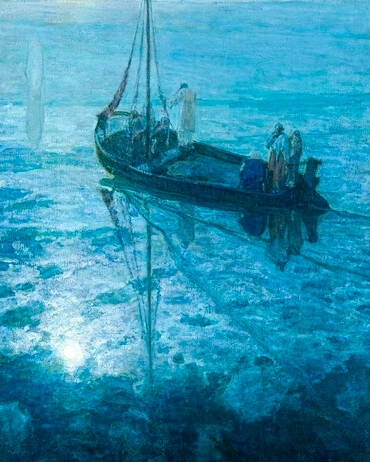1368. That 'Ur of the Chaldeans' means external worship containing falsities is clear from the meaning of 'the Chaldeans' in the Word. At verse 9 above it has been shown that 'Babel' means worship which interiorly contains evils, whereas 'Chaldea' means worship which interiorly contains falsities. Consequently Babel means worship which inwardly contains no trace of good and Chaldea worship which inwardly contains no trace of truth. Worship which inwardly contains no trace of good and no trace of truth is worship which interiorly contains what is unholy and idolatrous. That such worship is meant in the Word by 'Chaldea' becomes clear from the following places: In Isaiah,
Behold, the land of the Chaldeans! This people is not. Asshur founded her in the tziim. They will erect their watch-towers, they will raise up her palaces; he will make her into a ruin. Isaiah 23:13.
'The land of the Chaldeans who are not a people' stands for falsities, 'Asshur founded' for reasonings, 'watch-towers' for delusions. In the same prophet,
Thus said Jehovah, your Redeemer, the Holy One of Israel, For your sake I have sent into Babel and have broken down all the bars, and the Chaldeans in whose ships there is shouting. Isaiah 43:14.
'Babel' stands for worship which interiorly contains evil, 'the Chaldeans' for worship which interiorly contains falsity. 'Ships' means cognitions of truth that have been perverted.
[2] In the same prophet, sit in silence and go into darkness, O daughter of the Chaldeans, for no more will they call you the mistress of kingdoms. I was angry with My people, I rendered My heritage unholy, and I gave them into your hand These two things will come to you suddenly in one day - loss of children and widowhood. In full measure they will come upon you on account of the multitude of your sorceries, and on account of the greatness of your enchantments. Isaiah 47:5-6, 9.
Here it is evident that 'Chaldea' means profanation of truth and is called 'sorceries and enchantments'. In the same prophet,
Go away out of Babel, flee from the Chaldeans. Isaiah 48:20.
This stands for flight from profaning good and truth in worship. In Ezekiel,
Make known to Jerusalem her abominations; your father was an Amorite and your mother a Hittite. You committed whoredom with the sons of Egypt. You committed whoredom with the sons of Asshur. Hence you multiplied your whoredom even into the land of Chaldea. Ezekiel 16:2-3, 26, 28-29.
This refers to the Jewish Church in particular. 'The sons of Egypt' stands for facts, 'the sons of Asshur' for reasonings, 'the land of Chaldea into which it multiplied its whoredom' for the profanation of truth.
Anyone may see that Egypt, Asshur, and Chaldea are not used to mean countries, and that no other kind of whoredom is being referred to.
[3] In the same prophet,
Oholah committed whoredom and doted on her lovers, the Assyrians her neighbours. And she did not give up her acts of whoredom brought from Egypt. She added to her acts of whoredom. And she saw men; it was portrayed on the wall, images of the Chaldeans painted in vermilion, girded with belts on their loins, with dyed flowing turbans on their heads, all of them leaders in appearance, the likeness of the sons of Babel, the Chaldeans, the land of their nativity. She loved them passionately as soon as she set eyes on them and she sent messengers to them in Chaldea. The sons of Babel defiled her by means of their acts of whoredom. Ezekiel 23:5, 8, 14-17.
Here 'the Chaldeans', called 'the sons of Babel', stands for truths that have been profaned in worship. 'Oholah' stands for the spiritual Church which is called 'Samaria'. 1
In Habakkuk,
I am rousing the Chaldeans, a bitter and hasty nation, marching into the breadths of the earth, to possess habitations that are not its own. A dreadful and terrible nation; and from itself proceeds its judgement and its pride. Its horses are swifter than leopards, and sharper than the evening wolves. Its horsemen spread out, and its horsemen come from afar. They fly in like an eagle hastening to devour. The whole [nation] comes for violence; the panting desire of its face 2
is set towards the east. Habakkuk 1:6, 9.
Here the Chaldean nation is described by means of many representatives meaning the circumstances in which truth is profaned in worship.
A further description of Babel and Chaldea is given in two whole chapters - in Jeremiah 50, 51 - where it is plainly evident what they both mean. There Babel plainly means in worship the profanation of celestial things and Chaldea the profanation of spiritual things. From these considerations it is now clear what is meant by 'Ur of the Chaldeans', that it is external worship which interiorly contains what is unholy and idolatrous. I have also been allowed to learn from these people themselves that their worship was such.
Fotnoter:







